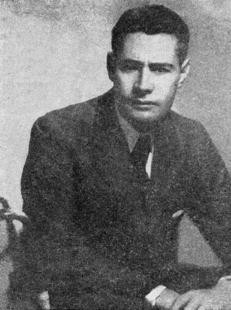Ju
Jung, Carl (1875-1961)
 Swiss psychologist and psychiatrist who founded Analytic Psychology, the first great rival to Sigmund Freud's psychoanalysis. Jung proposed and developed the concepts of the extroverted and introverted personality and archetypes which have been influential in psychiatry and are the basis of the Myer-Briggs Personality types. Drawing on concepts from astrology and mythology, Jung introduced the idea of the Collective Unconscious, wherein figures repeatedly appearing in dreams, myths etc., are supposed to have a substantial, non-material reality, and Jung openly declared himself a philosophical idealist.
Swiss psychologist and psychiatrist who founded Analytic Psychology, the first great rival to Sigmund Freud's psychoanalysis. Jung proposed and developed the concepts of the extroverted and introverted personality and archetypes which have been influential in psychiatry and are the basis of the Myer-Briggs Personality types. Drawing on concepts from astrology and mythology, Jung introduced the idea of the Collective Unconscious, wherein figures repeatedly appearing in dreams, myths etc., are supposed to have a substantial, non-material reality, and Jung openly declared himself a philosophical idealist.
The son of a pastor, Jung had a lonely childhood and from an early age was observing his father's failing belief in religion and the difficulties of the other adults around him. As a teenager he was already reading widely in philosophy, and attended the Universities of Basel and Zurich and graduated as a psychiatrist in 1900.
Jung then went to work at the Burghölzli Psychiatric Clinic in Zürich and became its Director in 1903. At Burghölzli, Jung applied the method of free association, which had been applied earlier by Freud, and identified groups of words that stimulated strong responses, which Jung took to be related to the patient's suppression of some common underlying disturbance, and which he took to have a sexual content. Jung coined the term complex to refer to these clusters of associations and the psychological condition behind them.
These researches gave Jung an international reputation, and from 1907 Jung collaborated closely with Freud, leaving the Institute to set up his own practice in Zurich in 1909, while continuing to lecture at the University of Zurich. Jung's findings confirmed many of Freud's ideas, and he was widely thought of as the most likely successor to Freud. However, like very many others in the years to follow, Jung did not share Freud's obsessive and exclusive focus on sexuality as the root of psychosis and this soon lead to an acrimonious split. Jung's Psychology of the Unconscious established his international standing, and Jung resigned from Freud's International Psychoanalytic Society in 1914.
One of the difficulties in appreciating Jung's achievement is that he focussed his work very much on the study of patients with extreme personality disorders; however, the mental structures that Jung was describing are equally characteristic of normal mentality. The most widely known of these structures was his identification of the Extroverted (outward-looking) and Introverted (inward-looking) personality types. Later he described four functions of the mind – Thinking and Feeling, the different ways in which people evaluate situations (“decision instruments”), and Sensing and Intuition, the different ways in which people organise their conception of the world. In any given person, one or the other of these functions will predominate over the other. Jung presented these ideas in his 1921 Psychological Types, the first modern theory of personality.
The other aspect of Jung's work which has been very influential is his approach to the analysis of dreams. After his break with Freud, Jung made an extensive study of his own dreams, taking extensive notes as soon as he awoke. Jung identified numbers of particularly vivid images, which he began to see were to be found not only in his dreams, but appeared in Mythology, and Religion across the ages, as well as being commonly reported by other people in their dreams. He coined the term Archetypes for these images – instinctive, universal images and associated behaviour patterns, and ascribed their appearance in the individual's mind to a Collective Unconscious, shared by everyone.
This linking of individual psychological experiences with belief patterns found throughout history led Jung to a study of the history of religion and social beliefs which was to be his main focus for the remainder of his life.
In later years he became Professor of Psychology at the Federal Polytechnical University in Zürich (1933-41) and Professor of Medical Psychology at the University of Basel (1943). Jung's belief that Germany held a special position in Europe, a view he was not shy to express in public, led to his being wrongly branded as a Nazi sympathiser. See his The Basic Postulates of Analytical Psychology
Jung, Franz (1888–1963) .
Higher studies, literary activities in expressionist movement. Deserted in 1914, joined Aktion group. Joined KPD(S) at Foundation Congress, in its left wing. In KAPD (Kommunistische Arbeiterpartei Deutschlands/Communist Workers Party of Germany) in 1920, delegate to Second Comintern Congress. Organiser of KAPD’s fighting groups, played important role during March Action, hunted by police, took refuge in USSR. Returned to Germany after 1923, correspondent of various journals, emigrated to USA, returned in 1945, thereafter merely literary activity.
Justo, Liborio (1902-2003)
 Argentinian Trotskyist. Member of the Argentine CP from
1934-37. He authored Estrategia Revolucionaria: Lucha por unidad y por
liberacion nacional y social de la America Latina, 1957 and Leon Trotsky y
el fracaso mundial del Trotskismo, 1959.
Argentinian Trotskyist. Member of the Argentine CP from
1934-37. He authored Estrategia Revolucionaria: Lucha por unidad y por
liberacion nacional y social de la America Latina, 1957 and Leon Trotsky y
el fracaso mundial del Trotskismo, 1959.
See Liborio Justo Archive in Spanish.